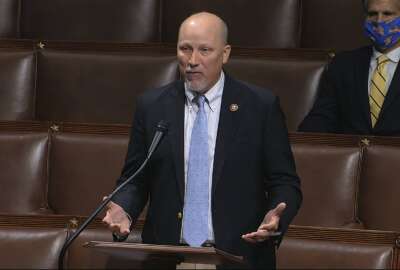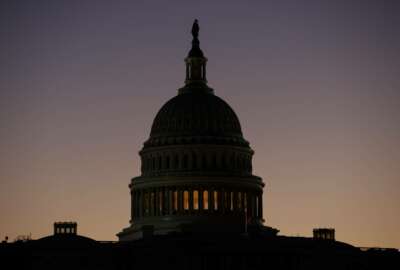Senate Dems introduce bill to prevent Schedule F from resurfacing
The Preventing a Patronage System Act would stop any federal job from reclassification outside of merit system principles.
Democrat Senate lawmakers proposed legislation that would prevent tens of thousands of federal workers from becoming at-will employees.
The Preventing a Patronage System Act, which Sen. Tim Kaine (D-Va.) introduced on August 2, would stop agency heads from reclassifying any federal civil service position outside of a merit-based system.
With the new bill, Kaine, along with Sens. Ben Cardin (D-Md.), Dianne Feinstein (D-Calif.), Alex Padilla (D-Calif.), Chris Van Hollen (D-Md.) and Mark R. Warner (D-Va.), aimed to prevent future administrations from reviving an executive order from the Trump administration, which added a Schedule F employment category for federal workers. The October 2020 executive order required agency leaders to reclassify “policy-determining, policy-making or policy-advocating” positions to the new category, covering approximately 50,000 federal workers.
“Their employment would be completely subject to the whims of an employer,” Kaine said at an August 2 press conference. “That was a system where everything was based upon loyalty to whoever was occupying the White House for a period of four years.”
The now-eliminated executive order meant at the time that agency heads could hire and fire feds at will, which applied to federal or civil service positions that were not in the competitive service or the Senior Executive Service. President Joe Biden removed the executive order in January 2021 during his first week in office.
“This would have undermined the merit system principles of our federal workforce, as it would have made it easier for any administration to hire political loyalists and fire qualified experts,” Kaine’s press release stated.
The Senate lawmaker’s new legislation would prevent any future administration from creating additional employee classifications, including the Schedule F classification.
“Workplace protections for federal workers exist for a reason: So any one administration cannot fire career employees and install their own political appointees,” Feinstein said in the bill’s press release. “Career federal employees must be protected from politics so they can do their jobs, and that’s what our bill would accomplish.”
Kaine said the legislation would better secure positions in the civil service and prevent tens of thousands of federal employees from losing job protections and due process rights, as well as bargaining rights.
“This legislation would put commonsense safeguards in place to protect the merit-based hiring system for our federal workforce,” Kaine said in the press release.
Federal unions and other organizations voiced their support for the legislation, including the American Federation of Government Employees, National Treasury Employees Union, National Active and Retired Federal Employees (NARFE) Association, Senior Executives Association, National Federation of Federal Employees and Professional Managers Association.
The lawmakers introduced the Preventing a Patronage System Act just after Trump met with former administration officials last week during a summit, reinvigorating a call to bring back Schedule F in a possible second term.
“We need to make it much easier to fire rogue bureaucrats who are deliberately undermining democracy, or at a minimum just want to keep their jobs,” Trump said in the summit’s keynote address.
Trump also called on lawmakers to pass legislation that would make it easier to fire career federal employees.
House Republicans reintroduced a bill on July 28 that would make all federal employees at-will workers and make it more difficult to appeal any firings based on retaliation or discrimination. The Public Service Reform Act would abolish the Merit Systems Protection Board (MSPB), an agency that protects federal workers from partisan political practices by hearing employee appeals.
Rep. Chip Roy (R-Texas), who introduced the Public Service Reform Act, said it “would empower federal agencies to swiftly address misconduct and remove underperforming employees.”
Also in the House, Rep. Jody Hice (R-Ga.) introduced legislation earlier this year, called the Accountable Federal Employees Act, aiming to revive Schedule F. The bill would create reforms to streamline federal employee removal procedures and limit work time spent on union activities.
House Democrats, though, made recent attempts in opposition to Schedule F. The House passed an amendment in July under the fiscal 2023 National Defense Authorization Act, which would block future administrations from bringing back Schedule F. The amendment, introduced by Rep. Gerry Connolly (D-Va.) passed in a 215-201 vote. Senate Democrats included a similar provision in the fiscal 2023 financial services and general government draft spending bill.
Other groups, like the Partnership for Public Service, also spoke out against the potential revival of Schedule F.
“Instead of undermining and politicizing the career federal workforce, the focus should be on improving our system by reducing the number of political appointees and streamlining the nomination and confirmation process, improving leadership development, placing greater emphasis on employee recognition [and] increasing accountability for poor performers,” Max Stier, the Partnership’s president and CEO, said in an Aug. 2 press statement.
Copyright © 2025 Federal News Network. All rights reserved. This website is not intended for users located within the European Economic Area.
Drew Friedman is a workforce, pay and benefits reporter for Federal News Network.
Follow @dfriedmanWFED






